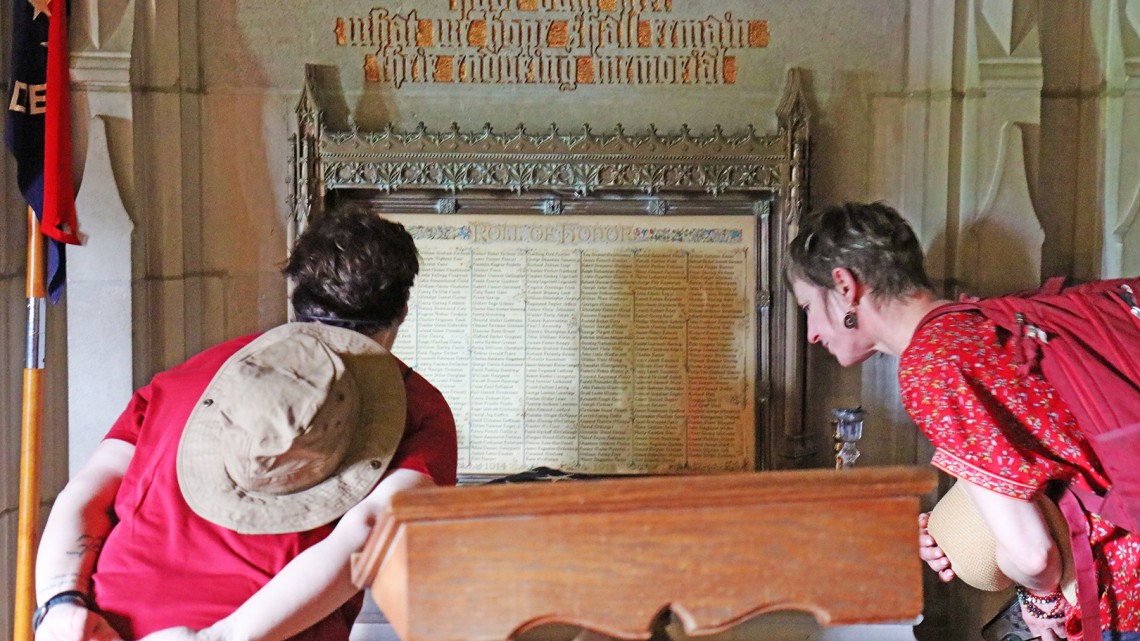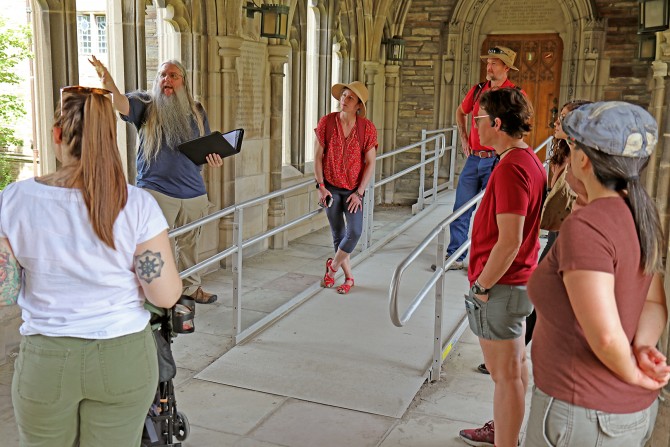
News directly from Cornell's colleges and centers
Step back in time on Cornell’s military history walking tour
By Grace DePaull
In the week leading up to Memorial Day, Cornell’s Veterans Colleague Network Group (VCNG) provided an opportunity for the Cornell community to commemorate the service and sacrifice of Cornellians who served in the military throughout the nation’s history. A walking tour commenced outside of Barton Hall on May 20, inviting staff, faculty and students to explore the rich military history of Cornell and its compelling presence on campus.
Led by Jeramy Kruser, Veterans Representative to the Employee Assembly and systems administrator for Cornell Information Technologies, the tour guided participants to significant war memorials across campus, such as those in Barton Hall, the War Memorial at Lyon and McFaddin Halls and the newer memorial plaques at Annabell Taylor Hall, with stops at Statler Hall and Sage Chapel along the way. Each edifice uncovered a unique tie to Cornellians who served in the military.
Participants also received exclusive access to the Wortham Military Museum on the third floor of Barton Hall that houses historic photos and military memorabilia, as well as an inside look at the Memorial Shrine in the north tower of the War Memorial. This is often kept locked by the Navy ROTC and is rarely opened to the public.
“We hope to share Cornell’s impressive military history with others,” said Emily Franco ‘92, historian of the VCNG and director of the School of Hotel Administration/The Culinary Institute of America Alliance at Cornell. “Service is an integral part of the Cornell experience, and this tour reflects and honors Cornellians who have performed dedicated service to their country and community. Jeramy has done extensive research on many of the stories of Cornell alums who have served over the years and is able to share a fraction of that knowledge through this tour.”
Since Cornell’s inception, military service has been rooted in the foundation of the university. Cornell was founded as a land-grant university under the Morrill Act of 1862, which explicitly required military tactics to be taught to students. Cornell’s first president, Andrew Dickson White, established mandatory military training for male students with the start of classes in 1868, lasting nearly one hundred years until it was eventually made voluntary in the 1960s. Cornell is one of only three Ivy League institutions that has offered continuous ROTC studies since World War I and is the only to retain all branches of service.
This robust and unique military history makes it nearly impossible for many Cornellians to fathom the depth and historical significance of all 13 memorial locations on campus. For Kruser, this is what ignited his passion to dig deeper and share his findings with the community.
“What really got me started was the thought that all we know from these memorials are names, maybe the date they graduated and when they died,” Kruser said. “I was interested in who these individuals actually were at Cornell. So, I began looking into the names on the memorials, and before long, I was caught up in the history and how little I knew about Cornell’s affiliation with our military.”
Since his first tour in 2019, Kruser has conducted research each year, filling gaps in his historical records, uncovering new stories of Cornellians who served and adding to his collection of factual tidbits recited on the tour. All of Kruser’s information stems from independent research conducted by scouring historical records in Cornell’s digital archive and the 627-page book, “Military Records of Cornell University in the World War.”
“My hope is that sharing a bit more of our history will make an impact on the culture and perception of military history at Cornell and encourage more veterans to look towards the university for education and employment,” Kruser said. “I love how surprised people are when they learn how deeply dedicated Cornell has been to our nation since the very beginning. I enjoy that this is an opportunity for our military community to connect with our larger community and take pride in our history with Cornell.”
Media Contact
Get Cornell news delivered right to your inbox.
Subscribe

